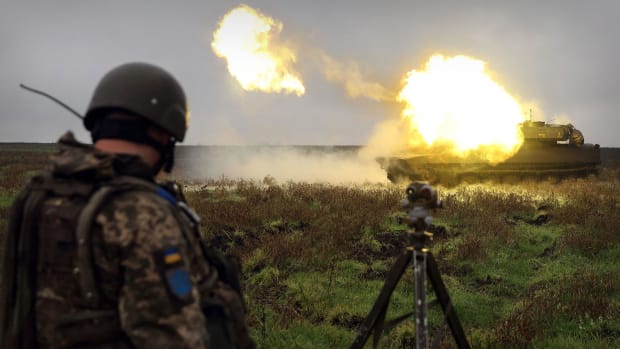While the Ukrainian capital has spent the last few months in a relative sense of calm compared to other regions, a new Russian attack has sent cruise missiles into the downtown core — and pushed several international aid organizations to cease working in the country.
Russia on Oct. 10 fired 84 cruise missiles into both Kyiv and numerous other cities across the country in what Russian authorities claimed was a response to an earlier fire on the Crimean Bridge.
While 43 of the missiles were intercepted by missile defense systems, many others landed at a central university, children's playground and numerous residential buildings in Kyiv.
At least 11 people were killed and more than 80 were injured as of Monday afternoon eastern time.
Red Cross, Norwegian Refugee Council Among Those Pausing Work
Along with immediate casualties, the attack also caused massive disruptions to humanitarian efforts in the country. The International Committee of the Red Cross, which had at least 700 staff delivering medicine and supplies throughout Ukraine, announced that it was temporarily suspending its work in the country over safety concerns.
"The wave of attacks, claimed by Russia, has impacted humanitarian operations across Ukraine, particularly hampering the movement of aid workers and delivery of emergency supplies in the east of the country, where people are in desperate need of assistance," Red Cross said in a statement to Reuters.
The Norwegian Refugee Council has also been on the ground as well as nearby countries like Poland, Moldova, and Romania to help with the flow of refugees displaced by the war.
"NRC had to pause our much needed relief operations today due to the rain of missiles on Ukrainian cities, but we hope to resume humanitarian work tomorrow," Secretary General Jan Egeland wrote on Twitter (TWTR). "We are in a race against a cold winter, so any further indiscriminate attacks will deny civilians lifesaving relief."
The United Nations Refugee Agency has continued to operate but also faces constant disruptions by the constant risk of incoming missiles.
As War Escalates, Humanitarian Aid Is Sorely Needed
The disruptions come at a particularly vulnerable time given the escalation of a conflict that began when Russian troops entered the country on Feb. 24.
Seven months of war have led to over 6,000 civilian deaths and over $100 billion in damage to Ukrainian infrastructure as diverse as hospitals and medical facilities, roads and airports, schools and kindergartens and private homes.
Large international humanitarian organizations are often criticized for directing large batches of the donations they receive to staff salaries, operational costs and other expenses related with keeping the charity running.

ANATOLII STEPANOV/AFP via Getty Images
Throughout the war, there has been a frequent push-and-pull about whether those from Western countries should donate to internationally-established organizations or smaller local charities like Razom For Ukraine and Nova Ukraine.
At the start of the war, some have also been booking Airbnb (ABNB) stays without intention of going there to have the money go to a specific individual or family.
But as the war progressed, what was a massive flood of individual donations in March and April has started to trickle down even as the situation on the ground gets worse.
One Canadian charity said that private donations totaled $457,154 in March but only $11,275 in July.
Read more about helping Ukraine both financially and in other ways here and here.







